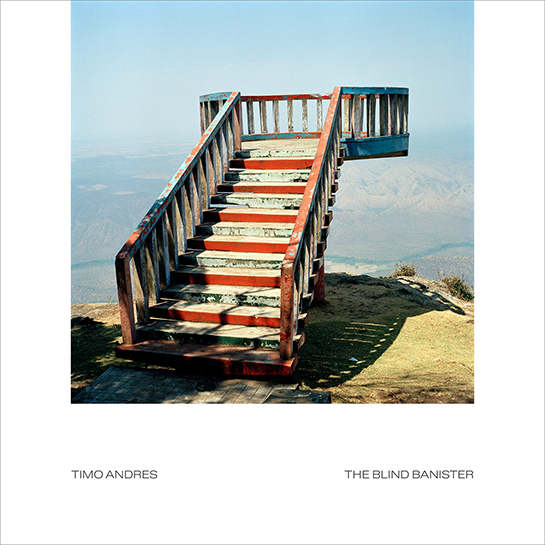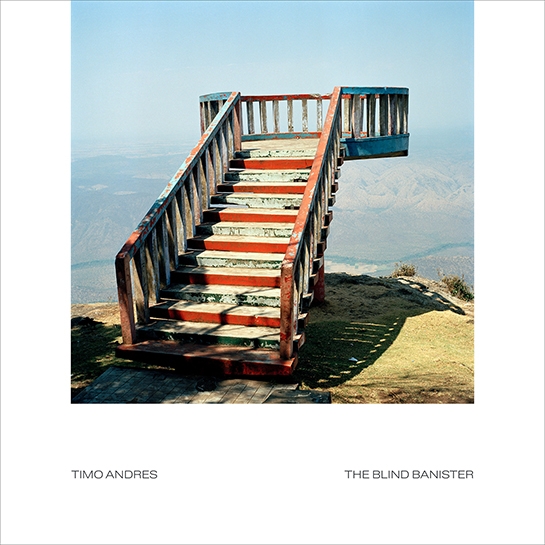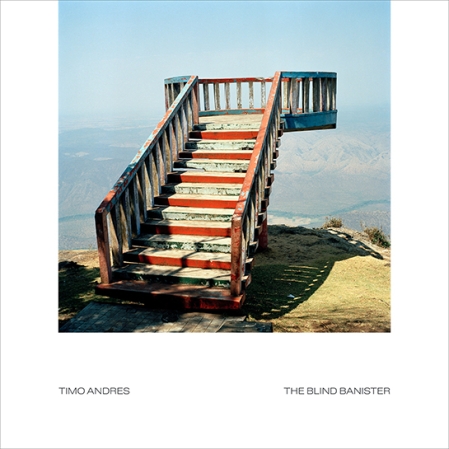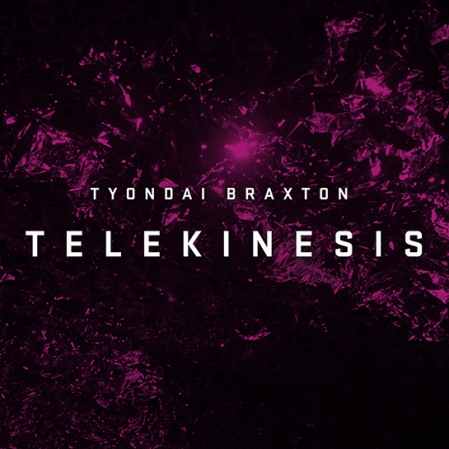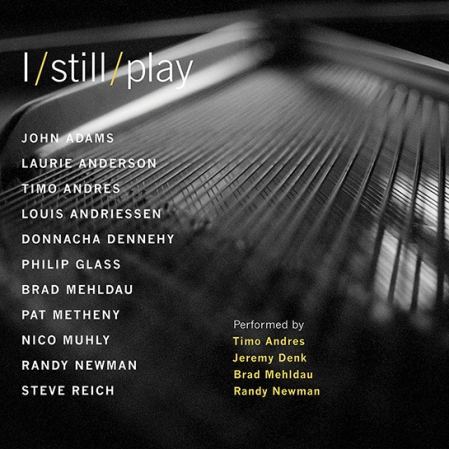Timo Andres’ The Blind Banister comprises three works by the composer/pianist: the piano concerto The Blind Banister (a finalist for the Pulitzer Prize in 2016), with Andres as soloist, and Upstate Obscura for chamber orchestra and cello, with soloist Inbal Segev—both of which feature Metropolis Ensemble and conductor Andrew Cyr—and the solo piano piece Colorful History, also performed by Andres.
Grammy Nominee for Best Engineered Album, Classical
Nonesuch released composer/pianist Timo Andres’ The Blind Banister on March 22, 2024. The album comprises three works by Andres: the composer’s third piano concerto, The Blind Banister, with Andres as soloist, and Upstate Obscura for chamber orchestra and cello, with soloist Inbal Segev—both of which feature Metropolis Ensemble and conductor Andrew Cyr—and the solo piano piece Colorful History, also performed by the composer.
Andres makes his Carnegie Hall solo debut on February 23, performing, among other works, Etude No. 20 by Philip Glass, and the world premiere of his own new composition, Fiddlehead. The debut was originally scheduled for April 2020, as a performance of the pieces from the Nonesuch album I Still Play. When the pandemic halted it, Andres instead streamed the recital on YouTube. The Glass Etudes recently were published in a new box set folio that Andres co-edited, and he performs some of them on NPR’s Tiny Desk series.
The Blind Banister was written for pianist Jonathan Biss to be performed alongside Beethoven’s second concerto. Andres says, “My piece is not a pastiche or an exercise in palimpsest. It doesn’t quote or reference Beethoven. There are some surface similarities to his concerto (a three-movement structure, a B–flat tonal center) but these are mostly red herrings. The best way I can describe my approach to writing the piece is: I started writing my own cadenza to Beethoven’s concerto, and ended up devouring it from the inside out.” The piece was a finalist for the Pulitzer Prize in 2016.
Upstate Obscura takes its inspiration from American painter John Vanderlyn’s Panoramic View of the Palace and Gardens of Versailles. Andres says, “In taking on a quintessentially French subject, Vanderlyn somehow came up with something that feels American; it seems to regard Versailles at a bemused distance, with that characteristically American distrust of anything unnecessarily fanciful. My plan was to start with fragments of musical ornament from the French Baroque tradition—like loose chunks of masonry—and stretch them out until they no longer felt like ornaments ... The solo cello moves … just as a viewer might explore a virtual world—at times wandering, at times with purpose.”
Andres describes the album’s solo piano work: “Colorful History is a chaconne, stemming from a single augmented triad, and following the course of various directions it suggests. I think of this as a kind of extended metaphor for historical events, and how they echo each other without literally repeating.”
Timo Andres (b. 1985, Palo Alto, CA) is a composer and pianist who grew up in rural Connecticut and lives in Brooklyn, NY. His 2013 Nonesuch album of orchestral works, Home Stretch, has been hailed for its “playful intelligence and individuality,” (Guardian) and of his 2010 debut album for two pianos, Shy and Mighty (performed by himself and duo partner David Kaplan), Alex Ross wrote in the New Yorker that “it achieves an unhurried grandeur that has rarely been felt in American music since John Adams came on the scene … more mighty than shy, [Andres] sounds like himself.”
Metropolis Ensemble is a Grammy-nominated nonprofit organization dedicated to commissioning and producing ambitious creative projects and expanding opportunities for emerging professional musical creators and performers to inspire audiences. They partner with world-class institutions to create, commission, and produce site-specific performances, new works, recordings, and digital experiences.
A champion of new work, Grammy-nominated conductor Andrew Cyr has led premiere performances at venues ranging from Cité de la Musique (Paris, FR), The Met Museum, Celebrate Brooklyn(!), New Victory Theatre, Hamer Hall (Melbourne, AU), Radio City Music Hall, BAM’s Next Wave Festival, and the Tonight Show. Cyr’s work as conductor has been described by Esa-Pekka Salonen as “precise, rhythmically incisive and fluid. He made complex new pieces sound natural and organic.” Described as a “prominent influence in the world of newly emerging music” (Washington Post), Cyr’s passion for creating new platforms for outstanding composers and performing artists led him to found Metropolis Ensemble in 2006.
Inbal Segev is “a cellist with something to say” (Gramophone). Combining “thrillingly projected, vibrato-rich playing” (Washington Post) with “complete dedication and high intelligence” (San Francisco Classical Voice), she makes solo appearances at leading international venues and with preeminent orchestras and conductors worldwide. Celebrated for her fresh insights into music’s great masterworks, the Israeli American cellist is equally committed to reinvigorating the cello repertoire, and has commissioned and premiered major new works from an international who’s who of today’s foremost contemporary composers.
PRODUCTION CREDITS
Produced by Silas Brown, Timo Andres, and Andrew Cyr
Recorded June 1-2, 2023 at Adelphi University Performing Arts Center
Engineered by Silas Brown with Doron Schachter
Assistant Engineer: Michael Schwartz
Edited by Timo Andres
Mixed by Silas Brown at Legacy Sound, New York, NY
Mastered by Matt Colton at Metropolis/The Power House, London, UK
Piano Technician: Kzuya Tsuijo
Piano: Fazioli
Cover Photo by Jason Fulford
Design by Ben Tousley
The Blind Banister was commissioned by The Saint Paul Chamber Orchestra, Caramoor Center for Music and the Arts, and Orchestra of St. Luke’s. The piece was premiered by pianist Jonathan Biss with the St. Paul Chamber Orchestra and conductor Mischa Santora on November 27th, 2015, at the Ordway Center for Performing Arts in St. Paul, MN.
Colorful History was commissioned by pianist Russell Hirshfield and premiered by Hirshfield on September 30, 2023 at Western Connecticut State University in Danbury, CT.
Upstate Obscura was commissioned by Inbal Segev and premiered by Segev and Metropolis Ensemble (Andrew Cyr, conductor) on April 21, 2018 at the Metropolitan Museum of Art.
This recording has been made possible in part through generous funding provided by Metropolis Ensemble, The Blanchette Hooker Rockefeller Fund, Thomas Brener, Kenny Greif, and The Aaron Copland Fund for Music Recording Program.
MUSICIANS
Timo Andres, piano
Metropolis Ensemble
Andrew Cyr, conductor and Artistic Director
Inbal Segev, cello
Isabel Gleicher, piccolo, flute
Stuart Breczinski, Hsuan-Fong Chen, oboe, English horn
Yoonah Kim, Graeme Steele Johnson, clarinet, bass clarinet
Brad Balliett, Nanci Belmont, bassoon, contrabass bassoon
Wilden Dannenberg, Laura Weiner, French horn
Brandon Ridenour, trumpet
Burt Mason, trombone
Victor Caccese, percussion
Nuiko Wadden, harp
Mika Sasaki, piano
Elizabeth Fayette, Katie Hyun, Siwoo Kim, Kristin Lee, Jennifer Liu, Christine Wu, Violin 1
Brian Hong, Ling Ling Huang, Doori Na, Oliver Neubauer, Henry Wang, Yezu Woo, Violin 2
Jay Julio, Daniel Kim, Halam Kim, Tanner Menees, viola
Laura Andrade, Estelle Choi, Sam Dicaprio, Jia Kim, cello
Evan Runyon, Luke Stence, double bass
